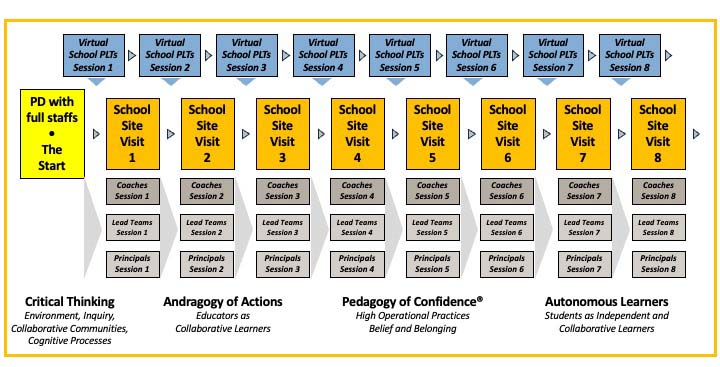Systems Thinking for the Whole Learning Community
- Andragogy
- Pedagogy
- Autonomous Learners
This page is a work in progress (October 2025)
Systems Thinking for the whole learning community thrives when integrating learning across the whole community with all the learners: students autonomously; educators pedagogy with students; educators andragogy with each other. This includes everyone in the learning community: students; educators; leadership; support staff; families. The process of implementation follows the ‘Pedagogical Flow Map’ of Priming—>Processing—>Understanding with all aspects. Knowing the stage we are on the continuum of understanding provides a sequence of implementation and learning. The ‘we’ includes the students, the educators, the educational leaders, the support staff and the families. We all invest in our roles of learning for self growth, community evolving and walking the talk with the whole learning environment.
To implement any content, the science of reading, writing, the arts and so forth, the pedagogy is the art that engages students, the andragogy is the educators learning collaboratively with a goal of the students believing in their capacity of autonomous learning.

with the Instructional Coach and Teacher mediating (their andragogy)
for their pedagogy with students.
Autonomous Learners (students)
Autonomous learners are self-directed, self-regulated, and intrinsically motivated individuals who take responsibility for their own learning process, setting goals, choosing methods, and evaluating their progress.
Pedagogy of Confidence® (of educators with students)
Pedagogy is the art and science of teaching, referring to the methods, strategies, and theories educators use to facilitate learning and promote student growth. High Operational Practices guide us in situating learning in the lives of students for high intellectual performance for belief in each student.
Pedagogy of Confidence® and High Operational Practices – Dr. Yvette Jackson
Andragogy of Actions (of educators learning with educators)
Adult Learning Theory or andragogy is the concept or study of how adults learn and how it differs from children.
•••
Autonomous Learners
Students as autonomous learners are consistent with the androgogy of the educators and the process with the High OperationalPractices (HOPs) with the Pedagogy of Confidence®. An example of the steps of progression can be by the example of: in the street children are…
- Carried
- Taken by hand
- Accompanied
- Crossing streets
- Independently deciding their itinerary
•••
Pedagogy in Practice
The Pedagogy of Confidence® becomes part of the educators patterns of teaching ‘getting out of the way of students’ to learn from their own actions while modeling to and with students models of excellence. The educators model being reflective of the processes to pattern the student’s understanding of being an independent learner. The High Operational Practices (HOPs) and their belief systems of each student are the grounding and guide for the educators practice in evolving High Intellectual Performance (HIP) with each student.
•••
Andragogy Together
To model ‘walking the talk’ as learners educators regularly practice with each other the pedagogy of teaching: andragogy. This models the educators as collaborative learners while situating learning in their lives, while learning from the students by situating the learning in the student’s lives. Teacher’s work in Professional Learning Teams (PLTs) that regularly plan, design, practice and reflect in focus groups on the implementation of their learning communities content and pedagogy.
The Pedagogical / Andragogical / Autonomous Learner Flow Map
The Pedagogical Flow Map (PFM) is the structure that creates a framework for translating the Pedagogy of Confidence® by Dr. Yvette Jackson into lesson or unit designs. The PFM addresses the:
- what — the standards of the disciplines and content acquisition
- how — engagement and enhancement of reading expertise
The PFM ensures alignment with the High Operational Practices® of the Pedagogy of Confidence®. This means that instruction will be designed around the development of cognition that leads to high operational performance.
Implementation
- Professional Development with the whole staff (on-site and virtual)
- Many demonstration lessons by consultant and school instructional coach to support patterns of learning with the educators (andragogy).
- Collaborate with Professional Learning Teams (PLT) who ‘demo’ lessons with each other which builds from the many professional development and many demonstrations lessons first by the consultant, then with the coach and evolving to a regular part of the PLTs practices.
- Regular focus group reflections.
- Regular documentation.
A Reflective Process
Examples of
Documentation
Examples of
Focus Groups and Qualitative Research
Examples of
Critical Thinking Methods and Strategies
Examples of





